I began writing this to help senior citizens find the right dog. As I wrote, I realized that the information is beneficial to people of all ages who are looking for a dog. Companion animals (cats and dogs in particular) provide multiple health benefits to all individuals. The health benefits can include an increase in physical activity, social support and interaction, and a decrease in cardiovascular disease and depression. It seems that, on almost a daily basis, scientists are finding more benefits to having a dog or cat, which can be seen on both the animal and the human side of the relationship. However, as with any human-animal interaction, there are possible downfalls.
All too many times, people get a new dog and the person and dog are not a good match for each other. The American Kennel Club (AKC) categorizes breeds of dogs into seven different groups; herding, hound, non-sporting, sporting, terrier, toy, and working. Breeds fit within each group based on the original job that they were bred to do. For example, the dogs in the sporting group are ones who are bred to assist hunters, the herding group is bred to protect and move livestock, and the terrier group is bred to go after rodents. In modern times, people breed dogs mostly for companionship rather than to do a job. However, the breeds still have some common behaviors that were originally bred into them when they needed to do a job effectively. Within each breed (Border Collie, West Highland White Terrier, Rottweiler, etc.) each individual dog has its own unique personality and temperament. When it comes time to get a new dog, the breed should play an important role in the selection process. For example, Huskies were originally bred to pull sleds long distances. Because of this, teaching a Husky to walk on a loose leash can be much harder than it is for other breeds, so they not ideal for a person with back issues or with shoulder, arm, or hand problems.
I have an 80-year-old client, let’s call her Debby, (names have been changed) who has a 1-year-old Border Collie named Thor. Debby has an older Pekingese, and she got Thor so she could have someone to walk. Debby’s doctors told her that, to help with her medical issues, she should be more active to decrease her pain and increase her blood circulation. Therefore, Debby wanted a more active dog to help keep her active.
If you’re unaware of typical behaviors in Border Collies, here are the basics: Border Collies were (and still are) bred to herd sheep. This allows a rancher to move flocks of sheep much easier, and it is less stressful for the livestock than herding with horses can be. Border Collies are extremely active, intelligent dogs that need constant training, exercise, and mental stimulation. I was called in to work with Thor because he was digging up Debby’s back yard, barking incessantly with complaints from the neighbors, jumping on people, and he could not be walked because he pulled. Thor is behaving the way he is because he is not getting the physical and mental stimulation required to keep a Border Collie happy and out of trouble. Because of this, Thor and Debby are not a good fit for each other. I do agree with Debby’s doctors that, the more active she becomes, the healthier she will get. Unfortunately, Debby hasn’t become more active with Thor, since he is currently so unruly that he cannot be handled.
If you’re looking for a dog, I highly recommend consulting a local trainer or behaviorist to help you find the perfect dog for your lifestyle. Some of the questions to ask yourself before you get a dog are:
What will your life be like in 5-10 years?
The average lifespan for a dog is 10+ years. If you are older, are you willing to accept that your dog may outlive you? If they do, what will happen to the dog? Also, do you see yourself moving into a smaller house or across the country?
Will you be getting the dog by yourself or with someone?
If you live with someone, make sure they are just as dedicated to having another dog as you are. If everyone in the house is on board, it makes adding a new family member much easier.
How much time can you dedicate to your dog?
If you’re retired, you may be at home frequently, but does that mean that you’re constantly with your dog, or will they be in the backyard by themselves most of the day? If they’re in the house, are they kenneled or do they have some freedom to roam around?
Can you afford to own an animal?
The cost to purchase a pure-bred animal can be extensive, but it is also important to remember that other costs are involved in having a dog. Food, veterinary care, supplies (leash, collar, tags, bowls, toys, beds, kennel, etc.), and training can all add up very quickly. These are all things that are constant and sometimes may be more expensive than others. For a more detailed break-down of the costs, check out the article What To Know Before Getting a New Dog: Part I.
Do you have support from others if you’re working late or traveling?
Sometimes, traveling has to happen. What are you going to do with your dog while you’re out of town or if you have to work late? Are you going to hire someone to come over to your house to take care of your dog? Are you going to pay a facility like Your Pet Space to board your dog while you’re gone? If you have a long day is your dog going to stay home alone or go to daycare?
How much household destruction can you handle?
Dogs, especially puppies, can easily destroy items in your house. Whether they are peeing or pooping in your house, chewing on your couch, or playing and knocking over breakables, are you willing or able to handle this?
If you already have a pet, is that pet likely to accept a new house mate?
Adding another animal into your house can be stressful for the pets you already have. If you have a cat and you get a new dog, will your new dog chase the cat? Also keep in mind the age(s) of the animals; if you have a 15 year old dog who has mobility issues, adding a puppy could cause more problems for your senior dog.
What do you hope to get out of the relationship with your dog?
Are you wanting a dog to cuddle with you? Do you want a walking buddy? Are you wanting a dog to do visitation work, become a therapy dog, or do agility? Do you want to do a lot of training? Knowing your goals for your future dog will help you find the best dog for your needs.
Do you have the time and resources needed for proper training?
Some dogs take more training time than others. Are you willing to spend the time needed to give your dog everything they need, both mentally and physically? Are you willing to hire a trainer to help you one-on-one if you’re having issues that you cannot correct? Are you willing to remain consistent with your training?
What breed or mixes of breeds should I get?
Even if you’re planning on adopting, look at the American Kennel Club (AKC) website to get detailed information on a variety of breeds and their individual needs. Some dogs need more grooming than others, some are more fit for apartments, and others aren’t good with kids. Talk with a trainer, behaviorist, or veterinarian for their input on what breed(s) may be best for your lifestyle.
Should I get a puppy or an adult dog?
Many people want a puppy. Younger dogs take more training and they take more time to work through typical puppy problems like potty training and chewing. Getting an adult dog or a senior dog may be more fitting to your lifestyle. An adult dog is more likely to come with some known basic training, such as potty training. A senior dog is also a great companion for someone who wants to take slow walks every day, but spend the rest of the time relaxing on the couch.
Should I adopt or buy a dog from a breeder?
If you know me, I am all for adopting. Rescue dogs make wonderful family members, but I am not here to preach. If you want to purchase from a breeder, make sure you do your research and make sure they are a reputable breeder. You should avoid puppy mills, pet stores, or anything that seems “sketchy” as much as possible.
How do I pick the right dog?
To find the right dog, spend time answering and thinking through the above questions. Do some research. Most importantly, take your time. Just because you go out one day looking for a dog, that doesn’t mean you need to find one that day. A lot of the time when people make an “in the moment” decision, they end up with a dog that is not a good match, much like Debby and Thor. Are you wanting another Labrador Retriever because you had one a few years ago that was absolutely amazing? Remember, even dogs who are the same breed have their own individual personalities. Just because you had a lab who loved to go hiking and could be trusted off leash, doesn’t mean another lab will be the same way.
Do you feel right about it?
Are you feeling pressure to get a dog? When you meet the dog, you should know without a doubt that this is the right dog. Follow your gut.
Every person is different. Every dog is different. There is no one way to find the perfect companion. The above is meant to help people narrow down their thoughts and help in beginning the process of finding the right dog. Your fur-ever friend might just find you when you least expect it. Good luck!
Claren Wilson is the head trainer at Cloud K-9 Dog Training Services. She is a certified professional dog trainer knowledge assessed (CPDT-KA) through the Certification Council of Professional Dog Trainers. She is also a distinguished graduate from New Mexico State University where she completed her Bachelor Degree in Animal Science with an emphasis in Companion Animals. Before staring Cloud K-9, Claren worked at a veterinary clinic in Corrales, NM and was a trainer at Petco. While at Petco, Claren became a dog training mentor and received her AKC Canine Good Citizen evaluater certification. Claren is Pet First Aid and CPR certified. You may email her at cloudk9nm@hotmail.com, call her at 575-524-2041, or visit her website, www.cloudk9nm.com.


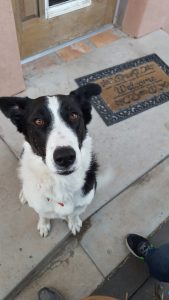
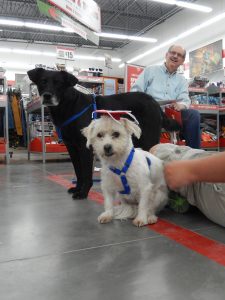
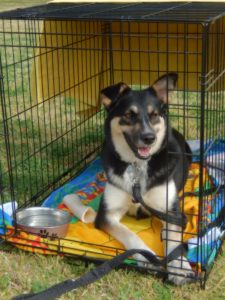
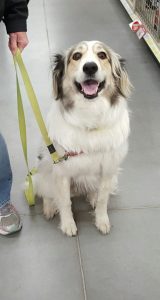

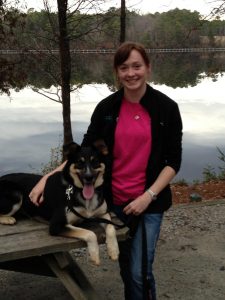
Pingback: What to Know Before Getting A New Dog: Part II